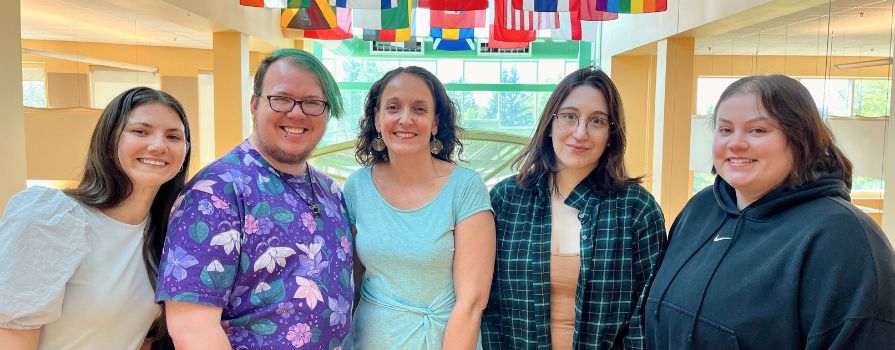Social sciences research: Empowering people and communities

Over the past two decades, the landscape of applied research at NSCC has undergone a transformation, growing from a single geomatics team to seven diverse research areas. Among these, social sciences emerged as a recent addition, owing much to the tireless efforts of Lisa Mader, a seasoned counselor turned researcher. Lisa's journey into social sciences research wasn't a deliberate career move but rather a natural progression from her decades-long role as a counseling therapist at NSCC.
Student homelessness research
Immersed in the lives of students facing societal challenges like housing insecurity, discrimination and poverty, Lisa began to notice recurring patterns and gaps that demanded attention. Over time, her work evolved beyond individual counseling sessions to a broader exploration of systemic issues affecting students and the community.
"When I began working on the national student homelessness project as a passion project, I had to get approval from the research ethics board," Lisa recalls. "Not many people at the College knew I was involved in this project initially. But when the AVP of Applied Research and Innovation learned about my work, he reached out wanting to learn more. So, that was November of 2022, and here we are, I've been a full-time researcher since then."
Lisa's involvement in the national Post-Secondary Student Homeless/Housing Research Network shed light on the hidden struggles of students facing housing insecurity, challenging stereotypes and advocating for awareness and tangible solutions. Through collaboration with other educational institutions across the country, she was able to gather and compare extensive data, revealing that 32% of NSCC students who participated in the research faced hidden homelessness, such as couch-surfing with family or friends. This nuanced understanding of homelessness underscored the importance of recognizing and addressing the diverse experiences and definitions of homelessness.
“This research has led to an Action Plan with recommendations for post-secondary institutions, government and community. That’s the applied part of the research - mobilizing findings and actioning change,” says Mader.
Preventing sexual violence in the marine industry
Building on her success in addressing student homelessness, Lisa embarked on another project six months into her research leave, evaluating Sea Change, a 1-hour course aimed at preventing sexual violence in the marine industry. Collaborating with the academic chair at Strait Area Campus, Lisa integrated the course into the first-year marine students' curriculum, introducing a feedback component to gather insights from course participants.
"I added a feedback component to the online module and conducted a focus group with nine students in February to gather their input," Lisa explains. "With this data, we aim to improve the course and potentially develop a version 2.0 for broader use."
Beyond the marine industry, Lisa envisions extending sexual violence prevention training to other male-dominated sectors like forestry and construction, recognizing the urgent need for systemic change across industries. "From healthcare to construction, sexual violence persists," she emphasizes, "This highlights the need for comprehensive prevention strategies and heightened awareness."
Building connections - Men's Social Spaces project
In collaboration with Shelter Nova Scotia, Lisa is in the process of embarking on a new endeavor aimed at addressing social isolation among homeless men, a group often overlooked in community engagement efforts. "Homeless men are a group that often gets left out of the conversation," Lisa notes. "Their voices are rarely heard, and their needs are often overlooked."
The Men’s Social Spaces project seeks to understand what fosters optimal social connections for homeless men and develop strategies to enhance their social well-being. By conducting interviews and engaging directly with the target population, they aim to gather insights that will inform the design of inclusive social spaces tailored to the specific needs of homeless men. Recognizing the importance of diversity and inclusion, they are committed to involving marginalized communities, including BIPOC and LGBTQ2+ individuals, in the project. "It's essential to consider diverse perspectives," Lisa emphasizes. "Everyone deserves to have their voice heard, and everyone's experiences matter."
At its core, the Men's Social Spaces project seeks to destigmatize homelessness, promote social connection, and ultimately improve the overall well-being of marginalized men in the community. "It's about more than just providing shelter," Lisa says. "It's about creating a sense of belonging and connection within the community."
Nurturing tomorrow's researchers
In addition to her research endeavors, Lisa plays a pivotal role in nurturing the next generation of researchers through mentorship. "I've had the privilege of working with several student research assistants," Lisa shares, "and it's been incredibly rewarding to witness their growth and development."
From engaging work term students to nurturing their skills through hands-on projects, Lisa creates a supportive environment where students can thrive. Through mentorship, she guides students' career paths, helping them discover their passions and aspirations. "Research is not just about data and reports," Lisa concludes. "It's about making a tangible impact on society. And with passionate students by my side, I believe we can achieve that goal together."
As Lisa continues her research journey, she remains grateful for the support of the college and the applied research team, enabling her to follow her passion and create positive change in the community.

